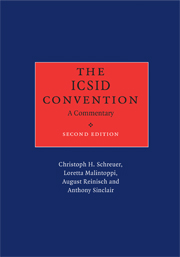Book contents
- Frontmatter
- Contents
- Foreword by Professor Sir Elihu Lauterpacht, CBE, QC
- Authors' preface to the second edition
- Table of cases
- List of abbreviations
- Text of the ICSID Convention
- Procedural calendar
- PREAMBLE
- CHAPTER I International Centre for Settlement of Investment Disputes
- CHAPTER II Jurisdiction of the Centre
- CHAPTER III Conciliation
- CHAPTER IV Arbitration
- CHAPTER V Replacement and Disqualification of Conciliators and Arbitrators
- CHAPTER VI Cost of Proceedings
- CHAPTER VII Place of Proceedings
- CHAPTER VIII Disputes between Contracting States
- CHAPTER IX Amendment
- CHAPTER X Final Provisions
- Article 67 Signature
- Article 68 Ratification and Entry into Force
- Article 69 Implementing Legislation
- Article 70 Territorial Application
- Article 71 Denunciation
- Article 72 Continuing Effect of Consent
- Article 73 Depositary
- Article 74 Registration
- Article 75 Notifications by Depositary
- Final Clause
- Consolidated bibliography
- Index by article
- Index by subject
Article 70 - Territorial Application
from CHAPTER X - Final Provisions
Published online by Cambridge University Press: 07 September 2010
- Frontmatter
- Contents
- Foreword by Professor Sir Elihu Lauterpacht, CBE, QC
- Authors' preface to the second edition
- Table of cases
- List of abbreviations
- Text of the ICSID Convention
- Procedural calendar
- PREAMBLE
- CHAPTER I International Centre for Settlement of Investment Disputes
- CHAPTER II Jurisdiction of the Centre
- CHAPTER III Conciliation
- CHAPTER IV Arbitration
- CHAPTER V Replacement and Disqualification of Conciliators and Arbitrators
- CHAPTER VI Cost of Proceedings
- CHAPTER VII Place of Proceedings
- CHAPTER VIII Disputes between Contracting States
- CHAPTER IX Amendment
- CHAPTER X Final Provisions
- Article 67 Signature
- Article 68 Ratification and Entry into Force
- Article 69 Implementing Legislation
- Article 70 Territorial Application
- Article 71 Denunciation
- Article 72 Continuing Effect of Consent
- Article 73 Depositary
- Article 74 Registration
- Article 75 Notifications by Depositary
- Final Clause
- Consolidated bibliography
- Index by article
- Index by subject
Summary
Art. 70 reflects the fact that at the time of the Convention's drafting a number of, mostly European, States were in possession of colonies and other overseas territories. These territories had varying degrees of autonomy. In order to provide additional flexibility, the Convention gives discretion to the States parties to include or exclude such territories from the Convention's application.
A provision reflecting the basic idea of Art. 70 was already included in the Preliminary Draft but without specification as to the time at which the written notice would have to be furnished (History, Vol. I, p. 298). Subsequent drafts provided for the notice to be given at the time of signature or subsequently (History, Vol. I, pp. 298/9; Vol. II, pp. 284, 443). This was replaced in the final version by “the time of ratification, acceptance or approval or subsequently”.
Art. 70 establishes a presumption that the Convention will apply to all territories of a State. The contrary would have to be expressed explicitly in a written notice to the Convention's depositary. In the absence of such a notice the Convention will apply.
Art. 70 gives maximum flexibility as to the time of the notice. The notice may be given at the time of consent to be bound by the Convention (Art. 68, para. 1). But it may also be given at a later time. This means that a State may withdraw territories from the Convention's application after its entry into force for these territories.
- Type
- Chapter
- Information
- The ICSID ConventionA Commentary, pp. 1276 - 1277Publisher: Cambridge University PressPrint publication year: 2009



